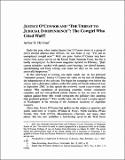|
Reseña:
|
Reseña:Justice O'Connor could not have chosen a better theme for her public appearances as a retired Justice. There is no need to belabor the importance of an independent judiciary to preserving the individual freedoms and economic opportunities that we as Americans take for granted.7 And Justice O'Connor is in a uniquely appropriate position to bring the issue to public attention. As a jurist who served on the United States Supreme Court for twenty-five years and, before that, on state courts and in a state legislature, she has a wealth of experience on which to draw. At the same time, having retired from participation in Supreme Court decision making, she is freed from the suspicion that she is attempting to aggrandize her own power.So Justice O'Connor has done the nation a service by bringing the subject of judicial independence to center stage and by calling attention to the important values it serves. Unfortunately, however, in describing the threats to that independence, she has presented a picture that is in some respects overstated and, in others, incomplete.Three points in particular deserve comment. First, Justice O'Connor has painted with too broad a brush in identifying what might be called external threats to the independence of the judiciary. Second, she has not adequately emphasized what I will call the internal aspects of judicial independence. Finally, although she has discussed the threat to judicial independence posed by the election ofjudges in the states, she has said little about the current process for judicial nominations in the federal system, aJustice O'Connor could not have chosen a better theme for her public appearances as a retired Justice. There is no need to belabor the importance of an independent judiciary to preserving the individual freedoms and economic opportunities that we as Americans take for granted. And Justice O'Connor is in a uniquely appropriate position to bring the issue to public attention. As a jurist who served on the United States Supreme Court for twenty-five years and, before that, on state courts and in a state legislature, she has a wealth of experience on which to draw. At the same time, having retired from participation in Supreme Court decision making, she is freed from the suspicion that she is attempting to aggrandize her own power.So Justice O'Connor has done the nation a service by bringing the subject of judicial independence to center stage and by calling attention to the important values it serves. Unfortunately, however, in describing the threats to that independence, she has presented a picture that is in some respects overstated and, in others, incomplete.Three points in particular deserve comment. First, Justice O'Connor has painted with too broad a brush in identifying what might be called external threats to the independence of the judiciary. Second, she has not adequately emphasized what I will call the internal aspects of judicial independence. Finally, although she has discussed the threat to judicial independence posed by the election ofjudges in the states, she has said little about the current process for judicial nominations in the federal system, adevelopment that may pose as serious a threat as any of the recent events that she does discuss.Before elaborating on these concerns, there are two preliminary points that I would like to acknowledge. First, I am not suggesting that Justice O'Connor is alone in expressing views such as those I will be quoting here. On the contrary, many of the same themes have been sounded in recent months by other judges (including some of Justice O'Connor's active colleagues on the Supreme Court), by commentators, and even by some political figures. But because Justice O'Connor and judicial independence have become virtually synonymous, it is likely that Justice O'Connor's formulations are the ones that future writers will quote.Second, even before Justice O'Connor began to speak: out, the subject of judicial independence had generated an enormous amount of academic commentary. In the last few years, the body of writings has expanded even further. Not only are there numerous individual articles in law journals and elsewhere, but there have been entire symposia; and the symposia, as Professor Charles Geyh has aptly stated, have themselves proliferated like rabbits. So I have no illusion that I can add any substantial new dimension to the discussion. Nevertheless, because Justice O'Connor's many speeches and public interviews have become so central to the debate, I think it is useful to look closely at what she has said and what we can learn from her warnings. |

